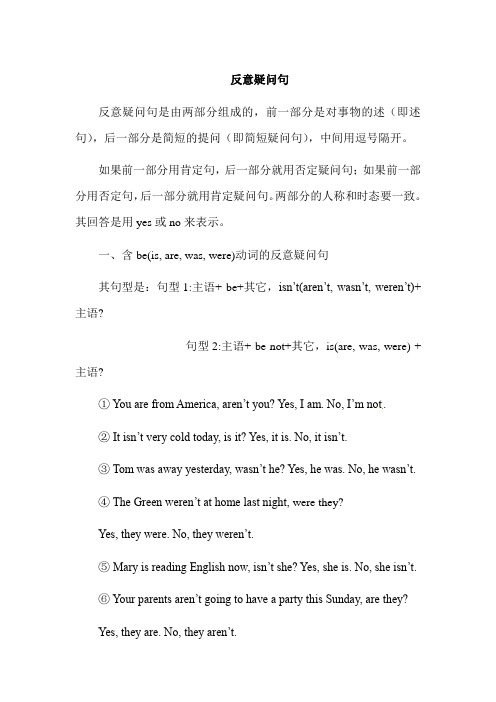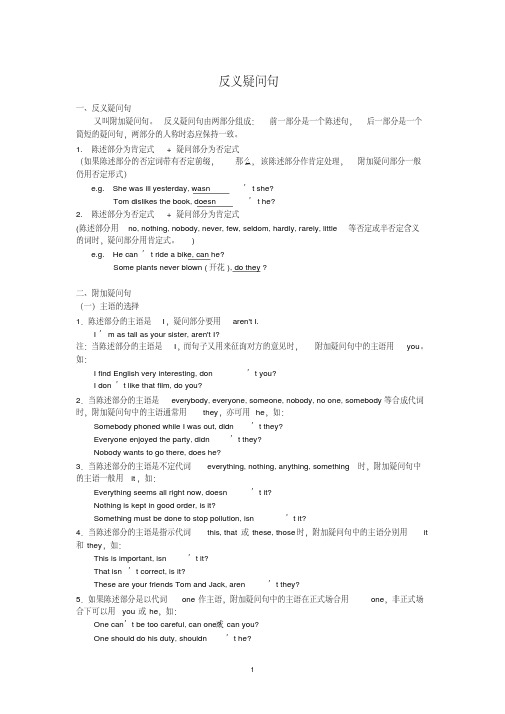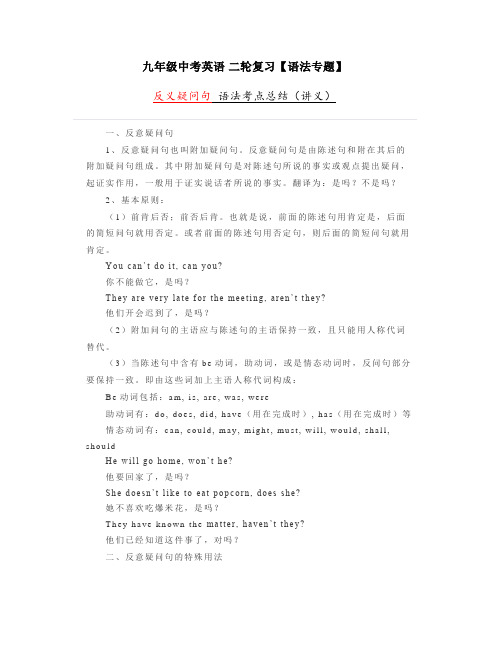中考语法复习-反义疑问句专题讲解
中考英语语法考点知识复习_反义疑问句

反意疑问句反意疑问句是由两部分组成的,前一部分是对事物的述(即述句),后一部分是简短的提问(即简短疑问句),中间用逗号隔开。
如果前一部分用肯定句,后一部分就用否定疑问句;如果前一部分用否定句,后一部分就用肯定疑问句。
两部分的人称和时态要一致。
其回答是用yes或no来表示。
一、含be(is, are, was, were)动词的反意疑问句其句型是:句型1:主语+ be+其它,isn’t(aren’t, wasn’t, weren’t)+ 主语?句型2:主语+ be not+其它,is(are, was, were) + 主语?① You are from America, aren’t you? Yes, I am. No, I’m not.② It isn’t very cold today, is it? Yes, it is. No, it isn’t.③ Tom was away yesterday, wasn’t he? Yes, he was. No, he wasn’t.④ The Green weren’t at home last night, were they?Yes, they were. No, they weren’t.⑤ Mary is reading English now, isn’t she? Yes, she is. No, she isn’t.⑥ Your parents aren’t going to have a party this Sunday, are they?Yes, they are. No, they aren’t.⑦ The girls were singing when the teacher came in, weren’t they?Yes, they were. No, they weren’t.注意:There be句型① There is an old picture on the wall, isn’t there?Yes, there is. No, there isn’t.② There aren’t any children in the room, are there?Yes, there are. No, there aren’t.③ There wasn’t a telephone call for me, was there?Yes, there was. No, there wasn’t.④ There were enough people to pick apples, weren’t there?Yes, there were. No there weren’t.二、行为动词的一般现在时的反意疑问句其句型是:句型1: 主语+动词原形+其它,don’t I(you, we, they)?句型2: 主语+ don’t+动词原形+其它,do I(you, we, they)?句型3: 主语+动词第三人称单数+其它,doesn’t he(she, it)?句型4: 主语+ doesn’t+动词原形+其它,doeshe(she, it)?① You often watch TV in the evening, don’t you? Yes, I do. No, I don’t.② The students don’t study hard, do they? Yes, they do. No, they don’t.③ Mary studies Chinese hard, doesn’t she? Yes, she does. No, she doesn’t.④ The boy doesn’t often go to school by bike, does he?Yes, he does. No, he doe sn’t.⑤The first class begins at eight, doesn’t it? Yes, it does. No, it doesn’t.三、行为动词的一般过去时的反意疑问句其句型是:句型1: 主语+动词过去式+其它,didn’t+主语?句型2: 主语+didn’t+动词原形+其它,did +主语?① You watched TV last night, didn’t you? Yes, I did. No, I didn’t.② Ji m’s parents didn’t go to Hong Kong last month, did they?Yes, they did. No, they didn’t.③ The rain stopped, didn’t it? Yes, it did. No, it didn’t.④Mr. Clarke didn’t buy a car, didn’t he? Yes, he did. No, he didn’t.四、一般将来时的反意疑问句其句型是:句型1: 主语+will+动词原形+其它,won’t+主语?句型2: 主语+ won’t +动词原形+其它,will +主语?①The boys will play games, won’t they? Yes, they will. No, they won’t.② It won’t stop raining, will it? Yes, it will. No, it won’t.③ Mr. Smith will visit our school next week, won’t he? Yes, he will. No, he won’t.注意:There be句型的一般将来时① There will be a basketball match tomorrow, won’t there?Yes, there will. No, there won’t.② There won’t be too much pollution in the future, will there?Yes, there will. No, there won’t.五、现在完成时的反意疑问句其句型是:句型1: 主语+have+动词过去分词+其它,haven’t+主语?句型2: 主语+ haven’t +动词过去分词+其它,have +主语?句型3: 主语+has+动词过去分词+其它,hasn’t+主语?句型4: 主语+ hasn’t +动词过去分词+其它,has +主语?① You have been to Shanghai before, h aven’t you? Yes I have. No, I haven’t.② You haven’t been to Shanghai before, have you? Yes I have. No, I haven’t.③Jack has done his homework, hasn’t he? Yes, he has. No, he hasn’t.④Jack hasn’t done his homework, has he? Yes, he has. No, he hasn’t.六、现在完成进行时的反意疑问句其句型是:句型1: 主语+have been+动词现在分词+其它,haven’t+主语?句型2: 主语+ haven’t been +动词现在分词+其它,have +主语?句型3: 主语+has been +动词现在分词+其它,hasn’t+主语?句型4: 主语+ hasn’t been +动词现在分词+其它,has +主语?① You have been skating for five hours, h aven’t you? Yes, I have. No, I haven’t.② You haven’t been skating for five hours, have you? Yes, I have. No, I haven’t.③ Bob has been collecting kites since 1999, hasn’t he? Yes, he has. No, he hasn’t.④ Bob hasn’t been collecting kites since 1999, has h e? Yes, he has. No, he hasn’t.七、含有情态动词的反意疑问句其句型是:句型1: 主语+情态动词+动词原形+其它,情态动词否定形式+主语?句型2: 主语+情态动词否定形式+动词原形+其它,情态动词+主语?① You can speak French, can’t you? Yes, I can. No, I can’t.②They can’t understand me, can they? Yes, they can. No, they can’t.③ Ann could swim when she was six, couldn’t she? Yes, she could. No, she couldn’t.④ The students must study hard, mustn’t they? Yes, they must. No, they needn’t.注意:You must go home now, needn’t you? Yes, I must. No, I needn’t.★值得注意的是有时英语的谓语动词并不用否定式(即没加上not),而是用上了“never, little, few, hardly, nothing, nobody”等词,这时该述句也属于否定句,因此,反意疑问句的后半部分应用肯定疑问式。
中考语法复习——反义疑问句

补充:陈述部分动词为have还有以下几种情况:
1.一般现在时中,have表“有”反义疑问句中谓语动词可用have及do。 Tom has a new watch, __h_a_s_n__’__t_/_dohees?n’t
2. have to + v. (had to + v.),疑问部分常用don't +主语(didn't +主语)。 Kate has to go home,__d_o_e__s_ns’ht e? 3.陈述部分有had better + v. 疑问句部分用hadn't ? We’d better stop talking. __h_a_d__n_’twe?
三、反义疑问句的得分法宝 1. 判定(判断该用肯定还是否定); 2. 找动(找句子的动词/助动词:be用be,动词:原形 do,三单does,过去did,完成have)注意时态。 3. 换代(将主语换为代词)难点在主从复合句; 4.根据事实回答。
1. be动词(am,is, are, was, were)的句型: Be动词“am”陈述部分的主语是I,疑问部分要用 aren't I. 现在时: 主语+is (are)…, 反疑:isn’t (aren’t) + 主语? 过去时: 主语+was (were)…,反疑: wasn’t (weren’t) + 主语?
中考初中反义疑问句讲解

中考初中反义疑问句讲解反意疑问句专题一、基本用法与结构反意疑问句由“陈述句+简略疑问句”两部分组成,第一部分提出一种看法,第二部分用来质疑或表示证实。
陈述部分与疑问部分的动词时态和动词性质应保持一致,而且肯定和否定形式彼此相反,即陈述部分为肯定式时,疑问部分用否定式,陈述部分为否定式时,疑问部分用肯定式:He likes English, doesn’t he? 他喜欢英语,是吗?He doesn’t like English, does he? 他不喜欢英语,是吗?【注】1. 若陈述部分含有hardly, never, few, nothing ,little,nobody,seldom等否定词或半否定词,其疑问部分要用肯定式:He has few friends here, has he? 他在这儿几乎没什么朋友,是吗?She said nothing, did she? 她什么也没说,是不是?2. 若陈述部分含有带否定前缀的词,疑问部分仍用否定式:It is unfair, isn’t it? 这不公平,不是吗?It is impossible, isn’t it? 那是不可能的,是吗?3. 当陈述部分为为there be句型时,疑问部分仍用there作“主语”:There was nothing in the room, was there? 房间里什么也没有,是吗?4. 当陈述部分的主语是指示代词(this ,that ,these ,those)时,疑问部分用it, t hey等代词:That is a new car, isn’t it? 这是一辆新汽车,是吗?5.当陈述部分的主语是复合不定代词时,若陈述部分的主语为somebody,someone, everyone, everybody, no one, nobody等复合不定代词,其反意疑问句的主语在正式文体中用he,在口语或非正式文体中通常用they:Nobody was late, were they? 没有一个人迟到,是吗?6.当陈述部分的主语是something, anything, nothing, everything等复合不定代词时,其反意疑问句的主语要用it:Everything is ready, isn’t it? 一切都准备好了吗?Nothing is important, is it? 没有什么重要的,不是吗?二、含情态动词的反意疑问句1. 基本原则:在通常情况下,当陈述部分含有情态动词时,疑问部分会重复前面同样的情态动词:He can speak English, can’t he?他会说英语,是吗?We shouldn’t go, should we? 我们不应该去,对不对?2. 当陈述部分含有must时,要分两种情况:①若must表示“必须”或“有必要”,疑问部分用mustn’t 或needn’t:You must leave at onc e, mustn’t [needn’t] you? 你必须(有必要)马上离开,是吗?但是若陈述部分有mustn’t表示禁止,疑问部分要must:You mustn’t laugh, must you? 你不准笑,知道吗?②若must表示推测,疑问部分不能用must,而应根据must后的动词结构采用相应的动词形式:He must be tired,isn’t he? 他一定累了,是吗?三、陈述部分为祈使句的反意疑问句1. 基本原则:若陈述部分为祈使句,疑问部分通常用will you:Please help us, will you? 请帮帮我们,好吗?Come with us, will you? 同我们一起去,好吗?Don’t forget to post the letter, will you? 请别忘了寄信。
反义疑问句知识点详解(初中英语专项复习)3

反义疑问句知识点详解(初中英语专项复习)一、定义反意疑问句又名附加疑问句。
属疑问句的一种,表示说话者对某事有一定看法,但又不完全确定,需要对方加以证实。
二、结构和原则:1.反意疑问句一般分为两个部分:前一个部分陈述句,后一部分为缩略形式的句问。
如:There is a tree in front of the building, isn’t there?2.反意疑问句遵守前肯后否, 前否后肯, 时态一致性的原则.三、用法:一.反意疑问句主语及谓语的确定.1.陈述部分含有never, few ,little,hardly,seldom,rarely(罕见), no,nothing, nobody, none, too…to 等表示否定意义的词时,其附加问句就用肯定形式.There are few people in the room, are there?She is too young to go to school, is she?2.陈述句部分是“There be…”结构时,疑问部分用“be there”.There is a tree in front of the building, isn’t there?There will not be any trouble, will there?3.陈述部分主语为this, that 等时,附加部分主语应用it.类似地,陈述部分主语为these, those等时,附加部分主语应用they.This is a beautiful picture, isn’t it?Those aren’t apple trees, are they?4.当陈述句部分动词为have(has)时有下列几种情况:(1)have在一般现在时中表示“有”之意,附加问句部分谓语可用“have”或用助动词do.Tom has a new watch, doesn’t he( hasn’t he)?(2) have to表示“不得不”“必须”之意时,附加问句部分谓语应用助动词do.Kate has to help her mother at home, doesn’t she?(3) have 表示“吃、喝、玩、度过”等意时,其附加问句的谓语应用助动词do.They have a good time in Beijing, don’t they?(4)have 在完成时中,其附加问句谓语动词应用have.Lucy has ever been to Japan, hasn’t she?(5) had better 最好,在祈使句中,其附加问句谓语动词应用hadYou had better clean the room,hadn’t you?5.肯定的祈使句的附加问句可用will you或won’t you,否定的祈使句的附加问句用will you.Listen to me carefully, will you?Don’t play with fire, will you?6.以let’s开头的祈使句,附加问句用shall we;而以let us 开头的祈使句,附加问句用will you.Let’s go to the park, shall we?Let us help you, will you?7.think, believe, expect, imagine, suppose等引导的宾语从句:A.主语是第一人称(应特别注意否定的转移)I don’t think he is bright, is he?We believe she can do it better, can’t she?B. 如果主语不是第一人称则疑问部分与主句相对应构成反意疑问句He thought they were wrong, didn’t he?8.否定前缀或后缀(否定前缀dis-, un-, im-或否定后缀-less,如dislike, discourage, unfair, unable等)不能视为否定词,其反意疑问句仍用否定形式。
中考英语专题复习 反义疑问句知识讲解

反义疑问句反义疑问句(The Disjunctive Question 或 Question tags) 即附加疑问句。
它表示提问人的看法,没有把握,需要对方证实。
反义疑问句由两部分组成:前一部分是一个陈述句,后一部分是一个简短的疑问句,两部分的人称时态应保持一致。
主要形式:陈述部分肯定式+疑问部分否定式;陈述部分否定式+疑问部分肯定式。
陈述部分和疑问部分要么前肯后否,要么前否后肯。
这类反义疑问句有时带有感情色彩,表示惊奇,愤怒,讽刺,不服气等。
例如:You call this a day's work,don't you?你说这就叫一天的活儿,不是吗?1什么是反义疑问句4速记方法7其他信息目录主语一般词语2反义疑问句的答案5重点归纳63句子结构什么是反义疑问句1.英语中,反义疑问句是由陈述句和附在其后的附加疑问句组成。
其中附加疑问句是对陈述句所说的事实或观点提出疑问,起证实作用,一般用于证实说话者所说的事实或观点。
翻译为“是吗句子结构1.陈述部分肯定句+疑问部分否定句(可记为前肯后否).例:They work hard, don't they?Let's go to the supermarket ,shall we?2.陈述部分否定句+疑问部分肯定句(可记为前否后肯).例:You didn't go, did you?句子类型一种是反义的附加疑问句;一种是非反义的附加疑问句。
简单来说,就是“前肯后否”或“前否后肯”。
反义疑问句的答案1.前肯后否:回答时,如果情况属实,用Yes加上反问句的倒装肯定句;如果情况不属实,则用No加上反问句的倒装否定句。
例如You were moved by your students, weren't 反义疑问句you?情况属实:Yes, I was. 情况不属实:No, I wasn't2.前否后肯::回答时,如果情况属实,用No加上反问句的倒装否定句。
初中英语语法之反义疑问句讲解 练习 答案

反义疑问句【反义疑问句】(一)概念:反意疑问句是由陈述句和附在其后的附加疑问句组成。
其中附加疑问句是对陈述句所说的事实或观点提出疑问,起证实作用,一般用于证实说话者所说的事实或观点。
(二)要点注意:1、反意疑问句前后两部分谓语应是:“肯定陈述+否定疑问”或“否定陈述+肯定疑问”。
2、简略问句如果是否定式:not应与be,do,will等系动词、助动词、情态动词缩写。
3、简略问句的主语不用名词,应用人称代词。
4、陈述部分含“too...to”时,是否定句。
(三)用法:1) 陈述部分I am时,疑问部分要用aren't I.I'm as tall as your sister,aren't I?(我和你姐姐一样高,对吗?)2) 陈述部分用no, nothing, nobody, never, few, little, seldom, hardly等否定含义的词时,疑问部分用肯定含义。
如:The old man made no answer, did he?Jim is never late for school, is he?3) 陈述部分有情态动词have to +v. (had to + v.),疑问部分常用don't +主语(didn't +主语)。
We have to get there at eight tomorrow, don't we?used to,疑问部分用didn't +主语或usedn't +主语。
He used to take pictures there, didn't he? / usedn't he?had better(最好)+ v. 疑问句部分用hadn't you?Y ou'd better read it by yourself, hadn't you?4) 陈述部分有would rather(宁可、宁愿)+v.,疑问部分多用wouldn't +主语。
(完整版)广东中考英语专项--反义疑问句语法讲解及练习(含答案)

(完整版)广东中考英语专项--反义疑问句语法讲解及练习(含答案)一、反义疑问句的基本结构与形式反义疑问句(The DisjunctiveQuestion) 即附加疑问句,是英语四大问句之一。
它表示提问人的看法,没有把握,需要对方证实。
句尾升调表示疑问,降调表示反问。
反意疑问句,由一个陈述句加上一个短问句而构成,基本构成形式是:陈述句+动词(肯定或否定)+主语?如:①She often has lunch at school, doesn’t she?②You don’t like sports, do you?反意疑问句通常对应规则:一)、反意疑问句中问句部分的动词与陈述部分的动词在语气上成相反的对应关系,即:)肯定+否定?否定+肯定?如:①You can’t do it, can you?②They are very late for the meeting, aren’t they?二)、反意疑问句中问句部分的动词与陈述部分的动词种类要对应一致。
如:①He has supper at home every day, doesn’t he? (不能用hasn’t he?)②They have known the matter, haven’t they? (不能用don’t they?)三)、反意疑问句中问句部分的动词在时态上应和陈述部分的时态一致。
如:①They will go to town soon, won’t they?(不能用don’t they?或aren’t they?)②He works very hard, doesn’t he?(不能用didn’t he?或won’t he?)基础练习1. You are an actor, ________ _____ ?2. He is a good boy, ________ ______ ?3. It was fine yesterday, _______ ___ ?4. You were studying when I called you last night, __________ _____ ?5. She is going to visit me, _____ ____?6. I am Chinese, ______ ____?7. It often rains here, ________ ___ ?8. He likes soccer, _________ ____ ?9. You have a headache, _______ ___ ?10. I called you yesterday, _______ __?11. You will go to America, ______ ___ ?12. We have ever been to Shanghai, _________ ______ ?13.His mother is a doctor, ______ ____ ?14. The dogs are fighting, _______ _____?15 There is a boy in our classroom, _______ _______ ?17. There were many cars in the street,_________ ________ ?18. There will be robots in our families,________ ______ ?19. Sit down please, _______________ ?20. Please call me, _________________?21. Let’s go home,_________ ?22. Let us go home, ________________ ?23 . Let me see, __________________ ?答案1.aren't you 2.isn't he 3.wasn't it 4.didn't you 5.won't she 6.aren't 7.doesn't it 8.doesn't he9.don't you 10.didn't you 11.won't you 12.haven't we 13.isn't she 14.aren't they 15.isn't there 17.weren't there 18.won't there19.will you 20.will you 21.shall we22.will you 23.will you二、反义疑问句的回答反义疑问句的回答始终遵从事实,事实是肯定用Yes+肯定句,事实是否定用no+否定句,如事实是你喜欢英语:You like English,don't you? Yes,I do.(是的,我喜欢。
中考英语语法专题系列-反义疑问句+倒装句

Chapter Twelve 反义疑问句&倒装句反义疑问句反义疑问句概述:反义疑问句表示的是:某人/物(没有)做了什么,(不)是吗?例:Jack doesn’t like playing football, does he?反义疑问句特点:1.前肯后否:主句为肯定,反义疑问部分为否定句2.前否后肯:主句为否定或含有表示否定意义的词时,反义疑问部分为肯定。
常见的表否定意义的词:never, seldom, no, few, little, hardly等。
例:Tom has never been to Beijing before, has he?反义疑问句结构:(考察重点)反义疑问部分构成:be/情态动词/助动词/will/ have(has/had完成时态中)+(not) +主语;注意:上述词的选择根据主句中谓语的情况而定,和一般疑问句的构成一致。
例:Lucy has few friends here, does she?Tony can swim, can’t he?They will go to Shanghai next week, won’t they?反义疑问句的回答:(考察重点)回答宗旨:根据主句所说的事实回答,陈述是真的,则用Yes回答,反之用No回答。
注意:没有Yes, he doesn’t. 或者No, he is. 之类的回答!!!!例:You are not a girl, are you?你是女孩的回答:Yes, I am. 不,我是。
你不是女孩的回答:No, I am not. 是,我不是。
中考中部分特殊的反义疑问句:(考察较少)1.Let’s go shopping tonight,__shall we____?2.Let us go shopping tonight, __will you___?3.Go shopping with me, ___will you____?4.Don’t go out, ___will you___?5.I think/believe he is right, __isn’t he____?6.I don’t think/believe he is right,__is he____?倒装句倒装句概述:一种语法手段,用于表示一定的句子结构或强调句子成分。
2023年中考英语语法复习反义疑问句

she ?/ hasn’t she?
2.do 助动词(用的 多)
2.have “生病,吃 she had a cold,didn’t she ? 根据实义动词选 喝玩乐,实义动 Tom has a bath,doesn’t he? 择对应的助动词
词”以及have to
英语专项:反义疑问句
have的用法
9. ---You have been to Shanghai before, haven’t you? ---Yes I have. /No, I haven’t.
10. —You haven’t been to the West Lake, have you?
—__A___. But I will go there with my parents this summer vacation.
7. ---The boys will play games, won’t they? ---Yes, they will. /No, they won’t.
8. ---It won’t stop raining, will
it?
---Yes, it will. /No, it won’t.
英语专项:反义疑问句
14.Be quick, will you ?
15.Don’t be late again, will you ?
16.Do it at once, will you
?
17.Let me have a try, will you ?
18.Let us leave now, will you
?
英语专项:反义疑问句
3.陈述句的主语是指示代词this/that, 疑问部分的主语用it;主语是these/ This is an English car, isn’t it? those,疑问部分用they
(完整版)英语语法:反义疑问句专项讲解

反义疑问句一、反义疑问句又叫附加疑问句。
反义疑问句由两部分组成:前一部分是一个陈述句,后一部分是一个简短的疑问句,两部分的人称时态应保持一致。
1.陈述部分为肯定式+ 疑问部分为否定式(如果陈述部分的否定词带有否定前缀,那么,该陈述部分作肯定处理,附加疑问部分一般仍用否定形式)e.g. She was ill yesterday, wasn’t she?Tom dislikes the book, doesn’t he?2.陈述部分为否定式+ 疑问部分为肯定式(陈述部分用no, nothing, nobody, never, few, seldom, hardly, rarely, little等否定或半否定含义的词时,疑问部分用肯定式。
)e.g. He can’t ride a bike, can he?Some plants never blown (开花), do they ?二、附加疑问句(一)主语的选择1.陈述部分的主语是I,疑问部分要用aren't I.I’m as tall as your sister, aren't I?注:当陈述部分的主语是I,而句子又用来征询对方的意见时,附加疑问句中的主语用you。
如:I find English very interesting, don’t you?I don’t like that film, do you?2.当陈述部分的主语是everybody, everyone, someone, nobody, no one, somebody等合成代词时,附加疑问句中的主语通常用they,亦可用he,如:Somebody phoned while I was out, didn’t they?Everyone enjoyed the party, didn’t they?Nobody wants to go there, does he?3.当陈述部分的主语是不定代词everything, nothing, anything, something时,附加疑问句中的主语一般用it,如:Everything seems all right now, doesn’t it?Nothing is kept in good order, is it?Something must be done to stop pollution, isn’t it?4.当陈述部分的主语是指示代词this, that或these, those时,附加疑问句中的主语分别用it 和they,如:This is important, isn’t it?That isn’t correct, is it?These are your friends Tom and Jack, aren’t they?5.如果陈述部分是以代词one作主语,附加疑问句中的主语在正式场合用one,非正式场合下可以用you或he,如:One can’t be too careful, can one?或can you?One should do his duty, shouldn’t he?6.当陈述句为there be结构时,附加疑问句中的主语也用there。
初中反义疑问句专题讲解

初中反义疑问句专题讲解反义疑问句知识点梳理一、基本用法与结构反意疑问句由“陈述句+简略疑问句”两部分组成,第一部分提出一种看法,第二部分用来质疑或表示证实。
陈述部分与疑问部分的动词时态和动词性质应保持一致,而且肯定和否定形式彼此相反,即陈述部分为肯定式时,疑问部分用否定式,陈述部分为否定式时,疑问部分用肯定式:HelikeEnglih,doen’the他喜欢英语,是吗?Hedoen’tlikeEnglih,doehe他不喜欢英语,是吗?【注】1.若陈述部分含有hardly,never,few,nothing,little,nobody,eldom等否定词或半否定词,其疑问部分要用肯定式:Hehafewfriendhere,hahe他在这儿几乎没什么朋友,是吗?Sheaidnothing,didhe她什么也没说,是不是?2.若陈述部分含有带否定前缀的词,疑问部分仍用否定式:Itiunfair,in’tit这不公平,不是吗Itiimpoible,in’tit那是不可能的,是吗3.当陈述部分为为therebe句型时,疑问部分仍用there作“主语”:Therewanothingintheroom,wathere房间里什么也没有,是吗?4.当陈述部分的主语是指示代词(thi,that,thee,thoe)时,疑问部分用it,they等代词:Thatianewcar,in’tit这是一辆新汽车,是吗5.当陈述部分的主语是复合不定代词时,若陈述部分的主语为omebody,omeone,everyone,everybody,noone,nobody等复合不定代词,其反意疑问句的主语在正式文体中用he,在口语或非正式文体中通常用they:Nobodywalate,werethey没有一个人迟到,是吗6.当陈述部分的主语是omething,anything,nothing,everything等复合不定代词时,其反意疑问句的主语要用it:Everythingiready,in’tit一切都准备好了吗?Nothingiimportant,iit没有什么重要的,不是吗拓展模块三、陈述部分为祈使句的反意疑问句3.当祈使句为Letu…时,若表示请求,疑问部分用willyou,若表示建议,疑问部分用hallwe:Letuknowyouraddre,willyou请把你的地址告诉我们,好吗Letugowimmingtogether,hallwe我们一起去游泳好吗四、陈述部分为主从复合句的反意疑问句1.当陈述部分为主从复合句时,疑问部分一般应与主句保持一致:Sheaidthathedidn’tlikeit,didn’the她说他不喜欢它,是不是?HeknowwhereIlive,doen’the他知道我住什么地方,是不是?2.当陈述部分为Ithink(believe,uppoe)that...等时,疑问部分通常与从句保持一致(注意否定的转移):1.当陈述部分是I’m…时,疑问部分通常用aren’tI:I’mwrong,aren’tI我错了,是吗I’molderthanyou,aren’tI我年纪比你大,对不对?2.当陈述部分是Iwih…时,疑问部分通常用mayIIwihtogowiththem,mayI我想同他们一起去,可以吗?3.当陈述部分有hadbetter时,疑问部分用had:He’dbetterleavehere,hadn’the他最好离开这儿,是吗?基础巩固题()1.Mr.Readiinteretedintalkhow,___________A.iheB.in’theC.in’tMr.ReadD.doen’the()2.Thechildrenhavenevereenaplane,___________A.havetheyB.don’ttheyC.haven’ttheyD.dothey()3.Hewanttohelpyou,___________heA.doeB.iC.doen’tD.in’t()4.Tomdidn’tfinihhihomework,_____________A.didTomB.didheC.didn’theD.didn’tTom()5.Thereiabeautifulclockonthewall,____________A.in’tthereB.ithereC.in’titD.iit()6.Heaidnothingatthemeeting,___________heA.didB.hadC.didn’tD.hadn’t()7.Dadreadthee-mailfromhifriendjutnow,___________A.didn’theB.doen’theC.wan’theD.wahe()8.–WeiFangdoen’tknowRuian,doehe–___________,hehanotlearnedRuian.A.No,hedoen’tB.Ye,hedoen’tC.Ye,hedoeD.No,hedoe()9.Thetudentareallready,___________A.aren’tthetudentB.aretheyC.aren’ttheyD.arethetudent()10.ThibookcothertwentyYuan,_____________A.didn’titB.doen’titC.diditD.doeit中考链接A.willheB.iheC.won’theD.in’the()2.Thereilittlemilkinthebottle,____________A.in’titB.iitC.in’tthereD.ithere()3.Idon’tthinkKendiduchatupidthing,_________A.doIB.didIC.d idheD.doehe()4.E-mailiverypopulartoday.Peopleeldomwriteletternow,_____ A.didtheyB.dotheyC.didn’ttheyD.don’tthey。
反义疑问句+语法考点总结(讲义) 中考英语+二轮复习语法专题

九年级中考英语二轮复习【语法专题】反义疑问句语法考点总结(讲义)一、反意疑问句1、反意疑问句也叫附加疑问句。
反意疑问句是由陈述句和附在其后的附加疑问句组成。
其中附加疑问句是对陈述句所说的事实或观点提出疑问,起证实作用,一般用于证实说话者所说的事实。
翻译为:是吗?不是吗?2、基本原则:(1)前肯后否;前否后肯。
也就是说,前面的陈述句用肯定是,后面的简短问句就用否定。
或者前面的陈述句用否定句,则后面的简短问句就用肯定。
Y o u c a n’t d o i t,c a n y o u?你不能做它,是吗?T h e y a r e v e r y l a t e f o r t h e m e e t i n g,a r e n’t t h e y?他们开会迟到了,是吗?(2)附加问句的主语应与陈述句的主语保持一致,且只能用人称代词替代。
(3)当陈述句中含有b e动词,助动词,或是情态动词时,反问句部分要保持一致。
即由这些词加上主语人称代词构成:B e动词包括:a m,i s,a r e,w a s,w e r e助动词有:d o,d o e s,d i d,h a v e(用在完成时),h a s(用在完成时)等情态动词有:c a n,c o u l d,m a y,m i g h t,m u s t,w i l l,w o u l d,s h a l l,s h o u l dH e w i l l g o h o m e,w o n’t h e?他要回家了,是吗?S h e d o e s n’t l i k e t o e a t p o p c o r n,d o e s s h e?她不喜欢吃爆米花,是吗?T h e y h a v e k n o w n t h e m a t t e r,h a v e n’t t h e y?他们已经知道这件事了,对吗?二、反意疑问句的特殊用法1、反意疑问句的陈述部分带有l i t t l e,f e w,n e v e r,h a r d l y,s e l d o m,n o b o d y,b a r e l y,s c a r c e l y,r a r e l y,n o t h i n g,n o o n e,n o n e,n e i t h e r等否定意义的词时,陈述句部分算否定,则问句部分用肯定式。
- 1、下载文档前请自行甄别文档内容的完整性,平台不提供额外的编辑、内容补充、找答案等附加服务。
- 2、"仅部分预览"的文档,不可在线预览部分如存在完整性等问题,可反馈申请退款(可完整预览的文档不适用该条件!)。
- 3、如文档侵犯您的权益,请联系客服反馈,我们会尽快为您处理(人工客服工作时间:9:00-18:30)。
反义疑问句
反义疑问句通常是陈述句(肯定/否定),+附加问句
形式:主+谓(肯/否)+.... , 谓(否/肯)+ 主(人称代词)?
主句附加问句
例:Mary likes eating fish,doesn't she?
Mary doesn't like eating fish,does she?
--喜欢(肯定事实)都回答:Yes,she does.
--不喜欢(否定事实)都回答:No,she doesn't.
试一试:
Jim will go to English,
She can swim,
Anna hasn't watched the TV programme,
注意:
1.前肯后否,前否后肯
2.在附加问句中,否定表达必须是缩写,如isn't,不可以写成is not。
3.针对反义疑问句的答句,我们要遵守根据事实答题的原则,不管是前肯后否还是前否后肯,只要肯定事实就答yes,否定事实就答no,
特殊情况(考点难点)
1.当陈述句中含“few,little,never,hardly,seldom,nobody,no one,nothing,neither,no等否定词时表否定,附加问句要用肯定
例:[[[[
*但是当陈述句中含否定词缀,如dislike,disagree,unhappy,unlike,careless..等词时,附加问句仍要用否定)
例:The girl is very careless,isn't she?
2.当主句为一般主从复合句时,附加问句的主谓要和复合句的主句保持一致
例:Amy thinks you will come to the party, doesn’t she?
*但是当主句为“I think/believe/guess/suppose+宾语从句”时,附加问句的主谓要和复合句的从句保持一致,但是根据主句选用肯定/否定句。
例:I don't think she will come,will she?
3.当陈述句中时there be结构时,附加问句用相应的be there 结构。
例:There isn't any water in the glass,is there?
4.当陈述句中时must be 结构表推测时,附加问句用isn't/ aren't+主语(人称代词)“结构。
例:The bag must be yours,isn't it?
*当陈述句中时must do 结构表必须时,附加问句用needn't+主语(人称代词)“结构。
例:I must finish the homework,needn't I?
*当陈述句中时mustn’t 结构表禁止时,附加问句用must+主语(人称代词)“结构。
例:You mustn't play football in the street,must you?
5.当陈述句中时Let’s结构时,附加问句用“Shall+ we”结构。
* 当陈述句中时Let us结构时,附加问句可用“will you”或“won't you”结构都可以。
例:Let’s go shopping,Shall+ we?
Let us go shopping,will you?/won't you?
6.当陈述句中时感叹句结构时,附加问句用“isn't it”结构。
例:what fine weather ,isn't it?
7.当陈述句中主语是从句/doing/to do,附加问句的主语用it
例:What you need is more important, isn’t it?
8.当陈述句中主语是表示人的不定代词someone/everyone/everybody/nobody/somebody.等表示个体时--附加问句的主语用he
表示全部时--附加问句的主语用they
例:Nobody wants to go there,does he?
*当陈述句中主语是表示物的不定代词everything/nothing/anything/something..等,
附加问句的主语用it
例:something is wrong with my radio,isn't it?。
